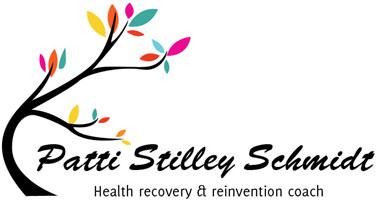
Attitude is everything when it comes to dealing with chronic illness.
By Patti Schmidt
Health coach and consultant
I learned the U.S. Marine Corps’ unofficial motto — improvise, adapt and overcome — when I was just 20 and in the U.S. Air Force. I’d spent a year as an aircraft mechanic, but I’d been able to switch to my dream job as a journalist. I was so excited to be training at the Department of Defense’s journalism school with young people from all of the U.S. Armed Forces at Fort Benjamin Harrison in Indiana.
At 54, I look back now and realize how very lucky I’ve been. We didn’t have a lot growing up, but my parents were loving, good people. My 5 sisters are supportive, and I was married for 20 years to someone who believed I was ill and who stood by me, and whose children loved and supported me as well. I was able to find physicians who successfully helped me recover and heal.
But that early military training determined my future, because it helped me develop an attitude geared toward resilience, adaptability and persistence. The military taught me the smartest thing I’ve ever learned: attitude is everything and getting the job done is job #1.
How’s your attitude? If it’s your job to heal right now, what are the steps you’re taking to meet that goal?
I also learned that teamwork and tenacity were just as important as job skills. The U.S. Air Force taught me how to think outside the box, gather a team I can work with, to believe in myself, and never, ever to give up.
Do you believe in yourself? What helps you never give up?
Improvise
If you’re having difficulty finding a local physician, make some phone calls. Ask some support group leaders for recommendations. Even if there’s no Shoemaker-certified physician near you, fibromyalgia, Lyme Disease and Chronic Fatigue Syndrome support group leaders might know some local doctors who’ve been forced to think outside the box because of the patients they treat. Look online. Ask everyone, and keep asking until you get some traction.
Look for functional medicine specialists, environmental and allergy specialists, and other doctors who are comfortable operating outside the mainstream. There you’ll find physicians who’ve learned to listen to their patients, and to use whatever they can to help them heal.
I’ve been finding lately, though, that for many clients, it’s smarter to simply fly to see a certified physician. For the cost of a plane ticket and a 1- or 2-night hotel stay, you get optimum care without drama, wasted time or money. You get all the labs done in the beginning, establish a treatment plan, and then once or twice a year, have a local physician consult with the specialist. That’s a smart, focused plan of attack.
What are you currently stuck about? Who might be a good resource to help you get out of that rut?
Adapt
When you’re chronically ill, you’re sometimes (often?) not able to command your life as you once did. But remember that regardless of whether you’re ill or not, no one has command over all things.
While not everyone can be taught the lessons chronic illness has to teach, the things you can learn are worthwhile. I have learned how to be happy without having everything I want, including health. I have learned that contentment can be invited into your life, welcomed and nurtured. I have learned that the best weapons I have to beat this are a positive attitude, a belief in myself and a good health-care team.
Who’s on your team? Are you welcoming contentment into your life and nurturing it once it gets there?
Overcome
Persistence is my weapon of choice. I lose hope now and again, but never for long. I simply get up the next day and try again. I make lists, I call for support, I invite others to help me heal. I never give up.
How can you foster persistence?
Patti Stilley Schmidt is a health coach, psychotherapist and consultant. She’s a chronic illness survivor, with years of experience managing, researching and advocating to improve the lives of the chronically ill, especially those with stigmatized illnesses like CIRS. She’s been a peer counselor, support group leader, national advocacy organization board member, and has written dozens of articles on these topics, along with the book Mold Warriors with Dr. Ritchie Shoemaker. She is finishing a Master’s degree in Clinical and Counseling Psychology at Chestnut Hill College in Philadelphia.
